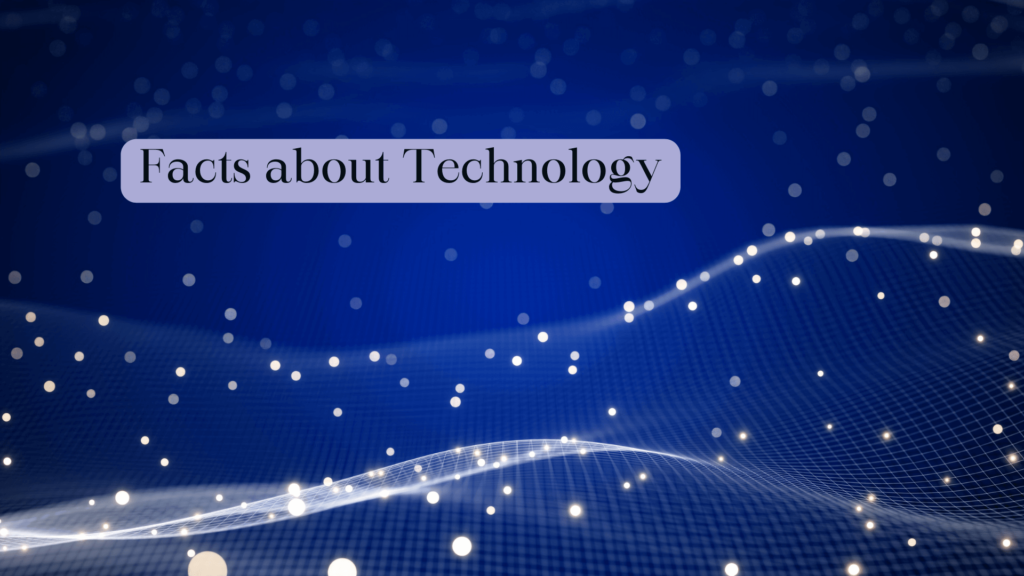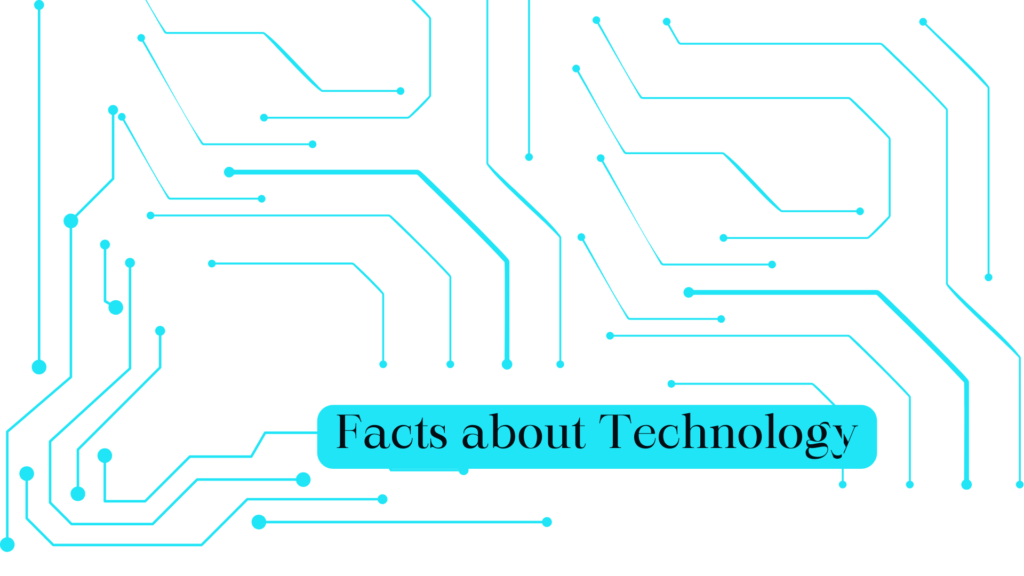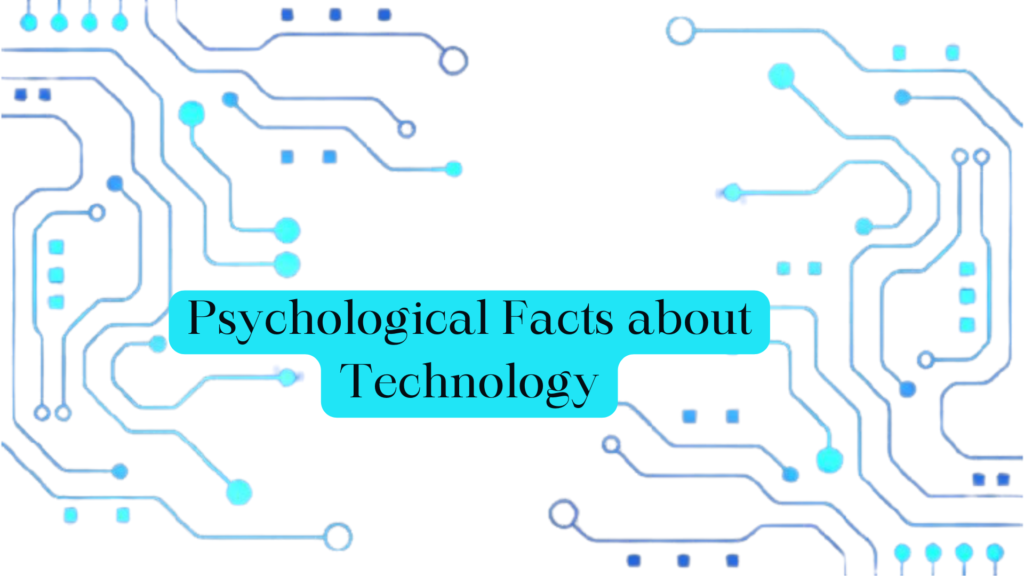Our Location
Islamabad, Pakistan

Science is vital to modern life. Furthermore to shortening and refining our excellence of life, the modern era’s many advances such as computers, satellites, X-rays, plastic surgery, electricity, the internet, photography, mobile phones, etc. also made it easier for us to deal with disease. To put it briefly, science has importantly aided humanity and civilization.
We’re going to learn some fun facts, mind-blowing, and interesting facts about technology in this blog.
Technology, often known as the amendment and management of the social environment, is the application of scientific data to the goals of daily life.
Technology is becoming more and more significant in both our personal and professional lives. It is crucial to understand how people practice technology and how technology affects how people interact with one another and the natural world. This is factual for everybody who uses technology in their personal and professional life, not just those who study, produce, and apply new technologies.
The word “technology” is not neutral. Depending on their perspective and the situation, various individuals will interpret it differently.
Here in this blog, we are going to discuss some fun facts, amazing and interesting facts about the technology. Let’s discuss it one by one starting from fun facts.
Here are some technology fun facts;

With an internet bandwidth of 91 terabytes per second, NASA guarantees quick communication and data transfer.
Samsung precedes Apple by a margin of 38 years and 1 month.
Doug Engelbart crafted the initial computer mouse in 1964, a rectangular wooden design.
Firefox’s logo has a red panda instead of a fox.
With the public launch of the World Wide Web on August 6, 1991, Sir Tim Berners-Lee revolutionized the global interchange and accessibility of information.
“Pong,” an Atari game from 1972, is often considered as the first commercially successful video game. It has a bouncing ball and two paddles. It was a table tennis simulation.
To improve your whole Alexa experience, the AI continuously records and keeps track of all of your talks.
Usually, for every 12 million spam emails sent, there is just one reply.
When reading via a screen, people usually read 10% slower than when reading on paper.
Over 6,000 new computer viruses are created and released each month, and 90% of emails include malware.

We are all aware that technology today controls most aspects of life. To get through our daily duties, the majority of us rely on our smartphones and other devices. We would be losing out on some of the biggest technological advances of the century if we didn’t have technology.
Let’s smash you with some incredible technology-related facts because there is so much to learn about this fascinating subject.

The computers utilized for the Apollo 11 lunar landing could not have performed computations as complex as the average smartphone today.
“Symbolics.com” was the first domain name registered on March 15, 1985.
The only person responsible for the pseudonymous creation of Bitcoin, the most well-known cryptocurrency in the world, is Satoshi Nakamoto; his genuine identity is still a mystery to this day.
The first camera was installed at the University of Cambridge to watch a coffee maker, allowing researchers to assess if it was worth walking for a cup.
This book features faces! Mark Zuckerberg and his Harvard colleagues created a computerized directory that included the faces of incoming students. Facebook has now developed into the world’s most popular social networking site.
The phrase “computer virus” was first used in 1983 by American computer scientist Fred Cohen, who took his cue from biological viruses.
Metal steel straws are designed to save the earth as a whole, in addition to turtles. It is important to remember, nevertheless, that a single metal steel straw releases a substantial amount of carbon dioxide and needs 2420 kJ of energy.
With an Internet speed of 319 terabits per second, Japan leads the world. With the use of fiber-optic lines, engineers have broken the global record by enabling the download of almost 80,000 movies every second.
When the word “hacker” first originated, it referred to a person who enjoyed exploring the complexities of programmable systems and expanding their potential.
Google began out as “Backrub,” a search engine developed by Larry Page and Sergey Brin. Backrub’s goal was to evaluate websites’ visibility and significance by examining backlinks, an essential component of Internet SEO.

These are some strange yet interesting technological facts that you may not be aware of;

“‘123456’ tops as the most used password, hacked 23.5 million times by 2020, each cracked in less than a second.
Google’s name was originally meant to be “Googol,” which is a mathematical word for one followed by 100 zeroes. However, it was eventually preserved due to a mistake.
Wi-Fi is a trademarked term with no specific acronym or meaning; it simply stands as a distinctive identifier for wireless technology.
1992 saw the sending of the first text message in history, which said “Merry Christmas.”
The fear of technology is known as technophobia, the fear of computers as cyberphobia, and the dread of not having a cell phone is known as nomophobia.
In the 1950s, people referred to personal computers as “Electronic Brains,” which is an accurate word with a little odd meaning.
The average individual blinks about seven times per minute when using a computer.
The English mathematician Charles Babbage is credited as being the founder of computers.
When a moth led to a computer system breakdown in 1947, the term “computer bug” was first used.
Find out how old is the internet at howoldistheinter.net . With a chronology of significant events and a current age of 11,926 days (as of November 5, 2021), users may determine the internet’s age based on their birthdate.

Psychological facts about technology are:

Phantom vibration syndrome, which is a common occurrence, is the feeling that a phone is vibrating when it’s not. This phenomenon is caused by the brain’s sensitivity to continuous connection.
Overuse of technology can result in addiction by producing brain dopamine releases akin to those brought on by drug addiction.
Social media use may have an impact on mental health, exacerbating conditions like anxiety, despair, and feelings of inferiority brought on by continual comparison.
Instantaneous connectedness and social media might intensify FOMO, negatively disturbing people’s mental health.
Digital detoxification, or taking vacations from technology, has been associated with better mental health by lowering stress and anxiety levels and enhancing sleep.
People who rely too much on technology for work and communication may find it difficult to draw boundaries between their personal and professional lives, which can lead to increased stress levels.
Social comparison, the process by which people evaluate their own lives about others, is frequently sparked by social media platforms and can result in emotions of inferiority or inadequacy.
Using technology to multitask can, contrary to common assumptions, lower overall productivity and raise stress levels.
When people browse the internet, they frequently look for content to support their opinions, which helps echo chambers emerge.
Some people display digital hoarding behavior, which is similar to physical hoarding in that they keep an excessive number of digital files or emails.

By graduation, technical degrees are essentially worthless. Every two years, the quantity of technological information doubles. That means that by the time you finish a four-year degree, half of what you learned will be outdated.
1. Even after almost 3,000 years, honey discovered in Egyptian tombs is still edible.
2. The distance that light travels in a year, or 5.88 trillion miles, is called a light-year.
3. An OS and a movie were both saved in DNA strands, demonstrating the potential of DNA as a data storage medium.
4. The combined weight of all people and ants on Earth is the same; the same is true for spiders.
5. Pitch is changed by the Doppler Effect when a sound source moves to an observer.
6. The Turing Test assesses how well a machine can simulate human intellect
1. Approximately 95% of the universe is made up of dark matter and dark energy.
2. Materials may be manipulated at the nanoscale by nanotechnology, which has applications in many different disciplines.
3. The stimulant caffeine, with the molecular formula C8H10N4O2, is present in both tea and coffee.
4. The combined weight of all the spiders on Earth and all the humans is equal.
5. Tim Berners-Lee developed the first website in 1991, which served as an explanation of the World Wide Web concept.
6. Because of its low water content and acidic pH, which prevent germs from growing, honey has a long shelf life.
Science and technology provide an incredible array of information, ranging from the permanency of honey found in ancient tombs to the universe’s immensity expressed in light-years. The complications of nanotechnology, the puzzles surrounding dark matter, and the possibilities of DNA as a data storage medium all serve to exemplify how constant research and development are reshaping our perception of reality. These data highlight the outstanding accomplishments and determined curiosity that fuel these areas’ gains and open the door to a future in which knowledge keeps growing.